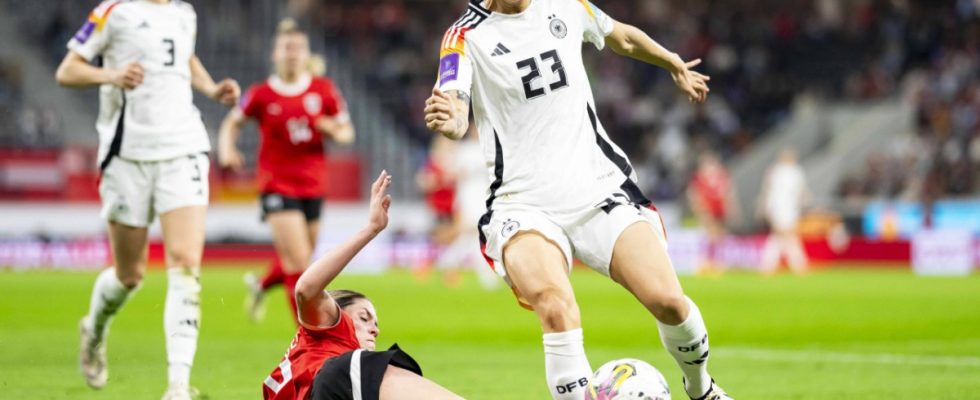The Pöstlingbergbahn laboriously makes its way from the main square in Linz up to the hill of the same name, where there is a fantastic view of the Upper Austrian capital. Visitors from all over the world can also clearly see the modern football arena from above, where the German footballers had to overcome a similar amount of hardship at the start of the European Championship qualification against Austria (3:2). Just as the historic railway uses a narrow track for the idyllic route, the eight-time European champion chose a narrow line to fulfill the first compulsory task on the way to the 2025 finals in Switzerland.
The topic of review should be less the successful catch-up, but rather the underground initial phase. Why were the protagonists with their stylish new national jerseys unrecognizable compared to the impressive playoff in the Olympic qualification against the Netherlands (2-0)? “We didn’t resist,” complained national coach Horst Hrubesch, who was almost in danger of falling off the back of his chair on the sidelines. At times they even allowed themselves to be “boiled”.
When Eileen Michelle Campbell from SC Freiburg, with the kind help of indisposed German defenders, scored twice after just 16 minutes and 7,500 fans were already chanting “Austria”, the new captain Giulia Gwinn gathered her colleagues in a circle “to set an example” .
In the first half hour the team was “not there”
The urgent speech was successful, but afterwards the 24-year-old was puzzled as to why the fickleness just wouldn’t leave this ensemble. “We weren’t there for the first 30 minutes!” Germany’s best, midfield clearer Lena Oberdorf, stated: “We simply have to be faster mentally.” When Hrubesch then demanded that “five or six players finally have to take responsibility,” it was clear that the soon-to-be 73-year-old would like to see more “Oberdorf types” who are not at all squeamish in the face of resistance.
The German team offered a variety like the colors of the historic buildings on the main square – everything from terribly hideous to wonderfully enchanting. It was nice how Klara Bühl brought the tie level with her consistent shots (39th and 49th), but even FC Bayern’s double goalscorer remarked self-critically: “We really made things difficult for ourselves today. The first 30 minutes were really nothing. “
In good Hrubesch fashion, impulses for the turnaround came from the bench at halftime. The HSV idol doesn’t shy away from taking consistent action. At the front, Laura Freigang provided some liveliness “between the rooms” in place of the ineffective Sydney Lohmann, while at the back, Bibiane Schulze Solano made a remarkable debut for the weakening Sara Doorsoun. The novice received compliments from all sides with how confidently the German-Spanish woman, who grew up in Bad Soden and trained at 1. FFC Frankfurt, defended. Schulze Solano started “from zero to one hundred,” said Hrubesch: “Everything she does has a hand and foot. That’s quite a quality.”
“The girls also know that we don’t play hardball.”
The debutante, who was extremely communicative on the pitch, was “megahappy” afterwards: “I tried to convey calm.” The structure of the game was a little different than at Athletic Bilbao, but from their point of view the adaptation worked. And no one in the family is now sad that it wasn’t the Spanish association that had invited them twice in vain. The 25-year-old revealed that her Basque mother Maravillas Solano was sitting in the stands together with her sister Natalie because they wanted to experience her debut in the Upper Austrian capital live: “She cried for joy.”
In the end, the German team was also able to celebrate cautiously thanks to a penalty kick (63′) that Gwinn once again converted with nerve-racking nerves. Hrubesch freely admitted that referee Tess Olofsson (Sweden) “doesn’t have to give the penalty” – the free pass was too deliberately arranged by goalkeeper Manuela Zinsberger. But there is no VAR check for women at this competitive level (yet).
The fact that the players on the Danube were once again puzzling with the Olympic Games (July 24th and August 11th) and the not easy group with Australia, the USA and Morocco or Zambia bothered Hrubesch immensely: “That we don’t have that The girls know that too. We have to play it better, more calmly.” After all: team spirit and character, morale and will were right. The teacher attributed the latent fluctuations to the fact that the team was “not well-coordinated”. In addition, he was always under pressure to succeed: “All the games were about winning. I couldn’t even test.”
But what could change in the next few weeks. If the next victory against Iceland in Aachen (Tuesday 6.10 p.m. / ZDF) succeeds in the European Championship qualification, Hrubesch could throw in his first experiments against the weakest group opponent Poland (May 31st and June 4th). But will his national team, which has apparently been permanently unsettled by the World Cup in Australia, be able to regain consistency so quickly? Hrubesch also has his doubts, who remarked to future national coach Christian Wück: “My successor will still have a lot of fun.” The warning undertone to a successful young coach could hardly be ignored in the home of the Linzer ASK.

